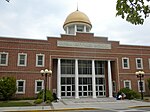Longport, New Jersey

Longport is a borough situated on the Jersey Shore on Absecon Island, within Atlantic County, in the U.S. state of New Jersey, on the Atlantic Ocean shoreline. As of the 2020 United States census, the borough's population was 893, a decrease of two people (−0.2%) from the 2010 census count of 895, which in turn reflected a decline of 159 (−15.1%) from the 1,054 counted in the 2000 census.Geographically, the city, and all of Atlantic County, is part of the South Jersey region of the state and of the Atlantic City-Hammonton metropolitan statistical area, which in turn is included in the Philadelphia-Reading-Camden combined statistical area and the Delaware Valley.In 2018, New Jersey Business Magazine listed Longport at 22nd in its listing of "The Most Expensive ZIP Codes in New Jersey", with a median sale price 2017 of $767,500.
Excerpt from the Wikipedia article Longport, New Jersey (License: CC BY-SA 3.0, Authors, Images).Longport, New Jersey
24th Avenue,
Geographical coordinates (GPS) Address Nearby Places Show on map
Geographical coordinates (GPS)
| Latitude | Longitude |
|---|---|
| N 39.311337 ° | E -74.526957 ° |
Address
24th Avenue 130
08403
New Jersey, United States
Open on Google Maps








